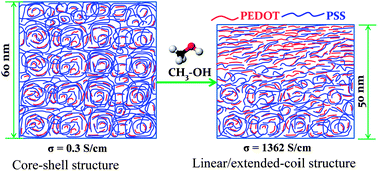Highly conductive PEDOT:PSS electrode by simple film treatment with methanol for ITO-free polymer solar cells
Abstract
We proposed a simple yet robust film treatment method with

Maintenance work is planned for Wednesday 1st May 2024 from 9:00am to 11:00am (BST).
During this time, the performance of our website may be affected - searches may run slowly and some pages may be temporarily unavailable. If this happens, please try refreshing your web browser or try waiting two to three minutes before trying again.
We apologise for any inconvenience this might cause and thank you for your patience.
* Corresponding authors
a Nanoscience and Technology Program, Taiwan International Graduate Program, Academia Sinica, Taipei 115, Taiwan
b
Research Center for Applied Sciences, Academia Sinica, Taipei 115, Taiwan
E-mail:
gchu@gate.sinica.edu.tw
Fax: +886-2-27896680
Tel: +886-2-27898000 ext. 70
c Department of Engineering and Systems Science, National Tsing Hua University, Hsinchu 30013, Taiwan
d Institute of Polymer Science and Engineering, National Taiwan University, Taipei 10617, Taiwan
e Department of Photonics, National Chiao Tung University, Hsinchu 300, Taiwan
We proposed a simple yet robust film treatment method with

 Please wait while we load your content...
Something went wrong. Try again?
Please wait while we load your content...
Something went wrong. Try again?
D. Alemu, H. Wei, K. Ho and C. Chu, Energy Environ. Sci., 2012, 5, 9662 DOI: 10.1039/C2EE22595F
To request permission to reproduce material from this article, please go to the Copyright Clearance Center request page.
If you are an author contributing to an RSC publication, you do not need to request permission provided correct acknowledgement is given.
If you are the author of this article, you do not need to request permission to reproduce figures and diagrams provided correct acknowledgement is given. If you want to reproduce the whole article in a third-party publication (excluding your thesis/dissertation for which permission is not required) please go to the Copyright Clearance Center request page.
Read more about how to correctly acknowledge RSC content.
 Fetching data from CrossRef.
Fetching data from CrossRef.
This may take some time to load.
Loading related content
